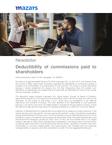
Deductibility of commissions paid to shareholders
By means of a judgment dated February 22, 2018 (Coproagro S.A. vs. Dian, M.P. Julio Roberto Piza), the Council of State made known its position regarding the deductibility of commissions paid by a company to its shareholders for the generation of new business. The ruling is of great importance because it clearly establishes the reasons why the High Corporation does not consider such deductions as appropriate, but accepts that such payments are deductible as long as they comply with the necessary conditions.
The discussion began because Coproagro S.A. (stock broker), through its Board of Directors, approved the payment of commissions to its shareholders (most of whom are large rice mills) for the acquisition of new clients so that these, in turn, would carry out transactions in the National Agricultural and Livestock Exchange. The Dian objected to the deductibility of such payments because, in its opinion, they were not indispensable or essential for the generation of income, so that they did not comply with the requirement of necessity provided for in article 107 of the Tax Statute.
Likewise, it indicated that such expense did not correspond to an expense normally customary in the activity carried out by the plaintiff, and was used by the plaintiff in order to benefit its shareholders and avoid withholding VAT at the source. In the first instance ruling, the Administrative Court of Tolima granted the claims of the plaintiff and consequently decreed the nullity of the administrative acts sued and declared the taxpayer's private tax return final. For this, the Court based itself on an expert evidence decreed ex officio which indicated that it constituted a "mercantile custom" the fact that the companies paid commissions to third parties that referred clients, regardless of whether they were shareholders or economic related parties. The expert opinion also indicated that such expenses corresponded to an expense and not to a dividend or a profit. The Dian appealed the decision.
In its judgment, the Council of State revoked the first instance judgment and proceeded to deny the claims of the lawsuit. In the first place, it completely rejected the expert opinion decreed by the judge of first instance under the argument that -although it had not been objected by the Dian for serious error- it did not deal with scientific, technical or artistic matters, but -on the contrary- with points of law. Secondly, although the High Corporation indicated that the taxpayer was referring indistinctly to "commissions" and "bonuses" (which is wrong from the legal and labor point of view), it established that the "expense of the bonus incurred by the company, may eventually fulfill the purpose of encouraging economic activity since it leads the shareholders to increase negotiations with farmers and this results in higher sales to the Bolsa Mercantil de Colombia".
However, this judicial body considered that, after reviewing the minutes and approvals made by the Board of Directors, these were given in October of the fiscal year under investigation (that is, ex-post to the sales that supported them) and with different percentages for each of the shareholders, for which reason the Council of State concluded that such disbursements corresponded more to the payment of a profit or dividend than to the effective payment of a commission or bonus. In this sense, it decreed the prosperity of the charge of the appeal.
It can be concluded then that the commissions paid to the shareholders of a company (as well as those paid to unrelated third parties) for referring new clients to the same, may be deductible as long as they comply with the criteria of necessity, proportionality and reasonableness established in article 107 of the Tax Statute.
Likewise, in the event that the evidentiary support and the corresponding authorizations do not make it clear that the operation is real, this deduction will be disregarded.


